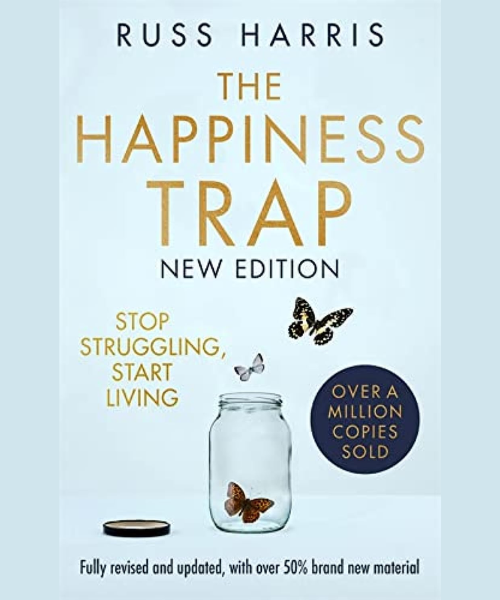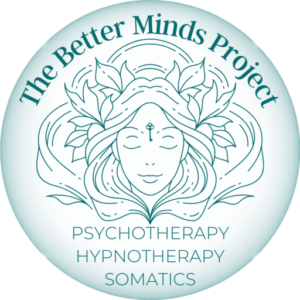
what is solution-focused therapy?
What is Acceptance & Commitment Therapy (ACT)?
Learning how to lean in to the whole spectrum of human experience without fear, and commit to living mindfully, in accordance with your core values.

If you’ve ever tried to push away a troubling thought only to have it boomerang back stronger, you’ve experienced first-hand how difficult it is to cope with feelings of anxiety by trying to supress them.
By recognising how exhausting it is to try and ignore or erase feelings of anxiety, Acceptance and Commitment Therapy (ACT) teaches us that we don’t need to struggle against uncomfortable thoughts and feelings in order to regain balance and wellbeing in our lives.
This really sets it apart from other models of therapy, and this approach has proven to be incredibly helpful as a model for the treatment of anxiety disorders, which is why I integrate the principles of ACT into my own practice.
So what exactly is Acceptance & Commitment Therapy About?
ACT is a type of therapy that evolved from cognitive-behavioural therapy (CBT). It focuses on helping people accept their inner experiences, commit to value-driven actions, and develop psychological flexibility. Instead of attempting to control or eliminate uncomfortable thoughts and emotions, ACT teaches you to accept them while making choices that align with your core values.
A key framework for change within Acceptance and Commitment Therapy is awareness of “The Choice Point.” The Choice Point is a moment where you are making a decision about something in your life – when you become aware that you have reached a Choice Point, you pause and reflect on whether your current actions are moving you towards your values, or away from them, as a result of fear.
This kind of clarity can make it easier to navigate challenging situations and stay grounded in what matters most.
This might sound counterintuitive at first. After all, most of us instinctively want to fix what feels wrong. But ACT takes a different approach: it’s less about fixing and more about finding the freedom to choose your experience based on what matters most to you in life.
How Does It work?

what is solution-focused therapy?
ACT revolves around six core processes that work together to help you cultivate a rich, meaningful life. Let’s break them down:
- Acceptance Rather than wrestling with difficult thoughts or emotions, ACT encourages you to make space for them. This doesn’t mean you’re surrendering to anxiety or resigning yourself to suffering; it means recognizing that uncomfortable feelings are a natural part of life and don’t have to control your actions.
- Cognitive Defusion Have you ever felt stuck in a mental loop, replaying a worry or self-critical thought? Cognitive defusion helps you see your thoughts for what they are: just words and images, not ultimate truths. Through techniques like labeling your thoughts (“Oh, there’s my ‘I’m-not-good-enough’ story again”), you create distance between yourself and your mental chatter.
- Being Present Mindfulness is a cornerstone of ACT. It’s about anchoring yourself in the present moment rather than getting swept up in worries about the future or regrets about the past. By focusing on the here and now, you can approach life with greater clarity and intention.
- Self-as-Context This concept encourages you to see yourself as more than your thoughts, emotions, or experiences. Instead of identifying with a thought like “I’m a failure,” ACT helps you recognize that you are the observer of that thought. This perspective can be profoundly liberating.
- Values ACT invites you to reflect on what truly matters to you. What kind of person do you want to be? What do you want your life to stand for? By clarifying your values, you can use them as a compass to guide your actions, even when the road feels rough.
- Committed Action Armed with your values, you can start taking meaningful steps toward the life you want. ACT emphasizes action, no matter how small, as long as it’s aligned with your values. Over time, these steps add up to big changes.
How ACT Helps with Anxiety

Anxiety often thrives on avoidance. We avoid situations that make us nervous, push away intrusive thoughts, and try to suppress uncomfortable feelings. While these strategies might offer temporary relief, they often backfire, leaving us feeling more anxious and stuck in the long run.
Here’s how ACT can help:
Breaking Free from the Struggle
ACT teaches you to stop fighting with your anxiety. Instead of trying to control every anxious thought or sensation, you learn to coexist with them. This reduces the power anxiety holds over your life.
Shifting Focus to What Matters
Anxiety can narrow your focus, making it hard to see beyond the immediate discomfort. ACT helps you reconnect with your values—the things that truly matter to you—and use them as a guide for your actions. For example, if spending quality time with loved ones is a core value, you might choose to attend a family gathering even if your anxiety tries to talk you out of it.
Building Psychological Flexibility
Psychological flexibility is the ability to adapt to life’s challenges while staying true to your values. It involves three key skills:
- Open: Accepting your thoughts and feelings without judgment.
- Aware: Staying present and observing your experiences as they unfold.
- Active: Taking actions guided by your values, even when it’s uncomfortable. With practice, ACT helps you develop this flexibility, making it easier to handle anxiety-provoking situations without being derailed by them.
Creating a Life Beyond Fear
By focusing on acceptance and committed action, ACT helps you build a life that’s rich and meaningful—not because you’ve eliminated anxiety, but because you’ve learned to move forward in spite of it.
A Simple Example: Tackling Social Anxiety with ACT

Imagine you’re invited to a party, part of you wants to go, you really want to hang out with some of the other people who are invited, but at the same time the thought of attending instantly creates a knot in your stomach, worries about feeling awkward, or not knowing how to join in with groups of people en masse might start tainting the odea of having fun. Before you know it, part of your brain is formulating excuses and reasons not to go.
In the past, you might have avoided the party altogether, convincing yourself it’s better to stay home, a mixture of guilt and relief flooding your mind and body as soon as you’ve sent that “I’m sorry I’m not going to be able to make it” text.
(Cue: Spending the next 24 hours stressing out about your no-show, worrying people will be annoyed at you flaking out etc etc. As it turns out, your stress levels are still pretty high regardless of having swerved the party, and yet you seem to default to this response whenever that social anxiety kicks in!)
With ACT, when this situation arises, you can follow this (much more helpful process) instead:
Acceptance: You acknowledge the anxiety (“I feel really tense and uncomfortable, and my mind is full of what-ifs”) without trying to suppress it.
Cognitive Defusion: You label your thoughts (“Ah, there’s my ‘What if I embarrass myself?’ or my ‘what is no-one talks to me’ thought”) and remind yourself these thoughts are just mental noise.
Being Present: You ground yourself in the moment, using a grounding exercise to reorient yourself in your body.
Values: You remind yourself why this matters (“I value my connections with my friends and I want to spend time with them, strengthening these friendships, enjoying the bond of shared experiences with them”).
Committed Action: Despite the anxiety, and the discomfort, you decide you’ll still go to the party, even if it’s just for 30 minutes or so.
Over time, these small but significant steps can help build confidence that you can cope, and you can do these things and enjoy your life, and this helps reduce the hold that anxiety has on your life.

Understanding why we use these techniques in ACT

If you’re intrigued by these ideas and want to dive deeper into ACT, Russ Harris’s book The Happiness Trap is a fantastic resource. It provides practical tools, including exercises and real-life examples, to help you cultivate psychological flexibility and escape the trap of chasing happiness.
Acceptance and Commitment Therapy isn’t about eliminating anxiety; it’s about changing your relationship with it. By embracing acceptance, practicing mindfulness, and aligning your actions with your values, you can create a life that feels meaningful and fulfilling—even when anxiety tags along for the ride.
Acceptance and Commitment Therapy isn’t about eliminating anxiety; it’s about changing your relationship with it. By embracing acceptance, practicing mindfulness, and aligning your actions with your values, you can create a life that feels meaningful and fulfilling—even when anxiety tags along for the ride.
Psychological flexibility is at the heart of ACT. It’s the ability to stay open, aware, and active in the face of life’s challenges, allowing you to respond to anxiety with resilience and purpose. If you’re struggling with anxiety and feeling stuck, ACT might just be the supportive, empowering approach you’ve been looking for. Remember, it’s not about fixing yourself because you’re not broken. It’s about finding freedom to live fully, just as you are.
If you really like the idea of improving your mental health in a positive goal-oriented way, but you feel like you need some professional support to get yourself started, feel free to get in touch. I’m an experienced psychotherapist and hypnotherapist with my own established practice. I use a combination of ACT, SFT, IFS and Somatic techniques, and I help people with this sort of stuff all the time.
I work online as well as in person (you can find out more about me here, and info about booking and prices here) if you’d like to work with me.
You can also pick up more tips and info on how to successfully hack your mental health on my socials, just click the icons below.
